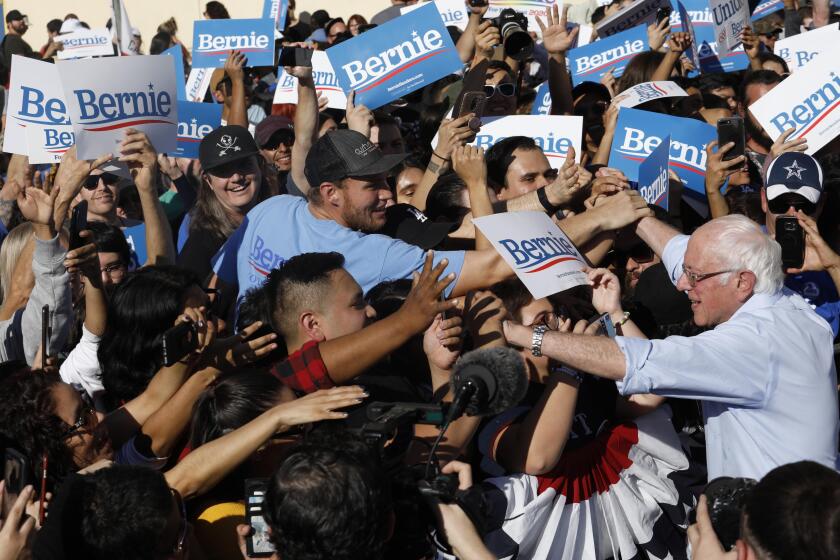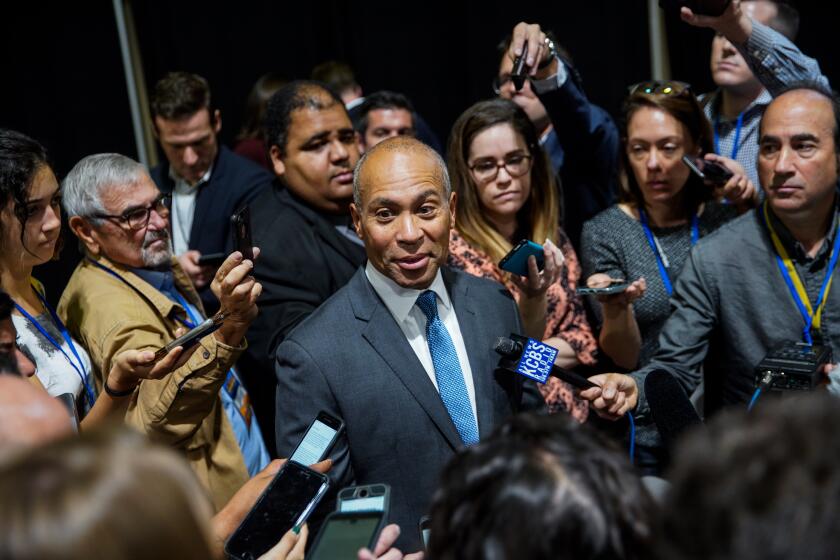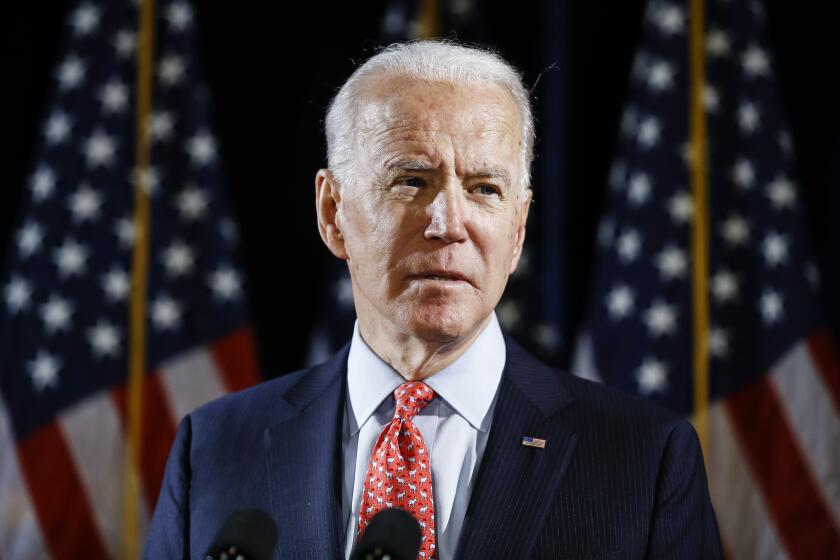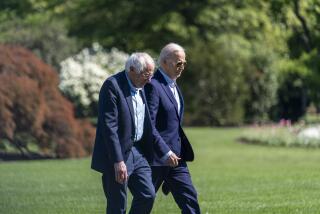How far can passion carry Bernie Sanders?
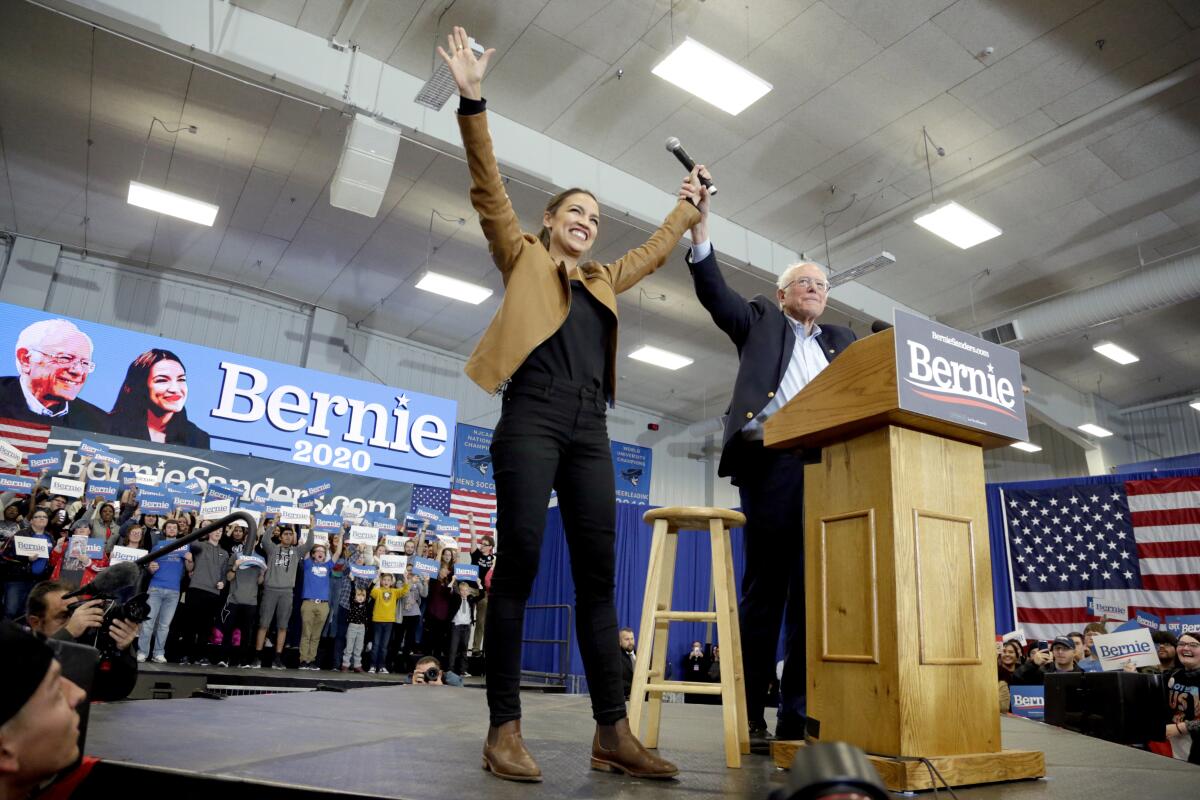
DES MOINES — Sheila Campbell was not a natural door-to-door campaigner. The Democrat from Urbandale, Iowa, canvassed for one day in 2008 for Barack Obama and hated it so much that she didn’t do it again.
Until this year.
Since early April, Campbell, an office manager for a neuropsychology clinic, has been knocking on doors and talking up Sen. Bernie Sanders to Democrats, Republicans, independents — to anybody who would listen. The day the Vermont senator had a heart attack in October, she went to a campaign office to volunteer more hours.
“This man is putting everything on the line for us,” Campbell, 51, said of Sanders. “Whatever I can do, if they call, if they ask, I say ‘yes.’”
With less than three months until the Democratic presidential caucuses in Iowa, the Sanders election machine is powered by the renewed zeal of the senator’s followers in the aftermath of his heart attack and by the endorsement of star freshman Rep. Alexandria Ocasio-Cortez of New York.
Some recent Iowa polls have shown Sanders trailing the front-runner. His campaign is hoping to gain ground by relying on the strong commitment of the senator’s base to draw in first-time caucusgoers who are primarily younger or working class.
“I think people would make a mistake to underestimate the enthusiasm that is still out there for Bernie Sanders,” said Democratic state Sen. Rob Hogg of Cedar Rapids, who is undecided in the race. “I think he’s turned a little bit of a corner, and just as I watch, I think he’s got some momentum now that he didn’t have three months ago.”
Bernie Sanders holds an L.A. rally as part of his strategy to mobilize Latinos, particularly younger voters, to help him win California’s Democratic primary.
A CNN/Des Moines Register/Mediacom poll released Saturday shows Mayor Pete Buttigieg of South Bend, Ind., as the latest candidate to take the lead in Iowa, pushing past Sen. Elizabeth Warren of Massachusetts, former Vice President Joe Biden and Sanders. All four are poised to meet the 15% threshold of support required to win a share of Iowa’s delegates in the Feb. 3 caucus that starts the presidential nominating process.
The crowded field has diluted the following Sanders built in 2016, when he shocked the political world by fighting the more moderate Hillary Clinton to a draw in Iowa. Many former supporters also have raised concerns about the age of the 78-year-old senator.
That, along with the fact that Sanders turns off more centrist voters for being too left-wing, has led some experts to discount Sanders’ prospects.
“Sanders has seen his day,” said Hugh Winebrenner, professor emeritus of political science at Drake University in Des Moines. “He’s hanging around. He still has some loyal supporters, but he’s not going anywhere fast.”
Yet Sanders is in a similar position as in 2016: within range of a top finish, supported by a die-hard base galvanized by his economic appeal to working-class voters.
“We are taking the most ambitious path to the nomination,” Sanders’ Iowa state director, Misty Rebik, wrote in a 100-days-to-go memo to supporters at the end of October, which outlined the campaign’s plan to expand the electorate.
The campaign aims “to energize and mobilize constituencies that are often the most difficult to turn out,” she wrote, “including first-time voters, students and young voters, working class people with multiple jobs and low-income voters who feel ignored by our political process.”
Of the Sanders supporters who remain from 2016 or who plan to caucus for the first time in 2020, more than half say they are committed to caucus for the senator, two recent polls show. That level of commitment is more than 20 percentage points better than the next candidate.
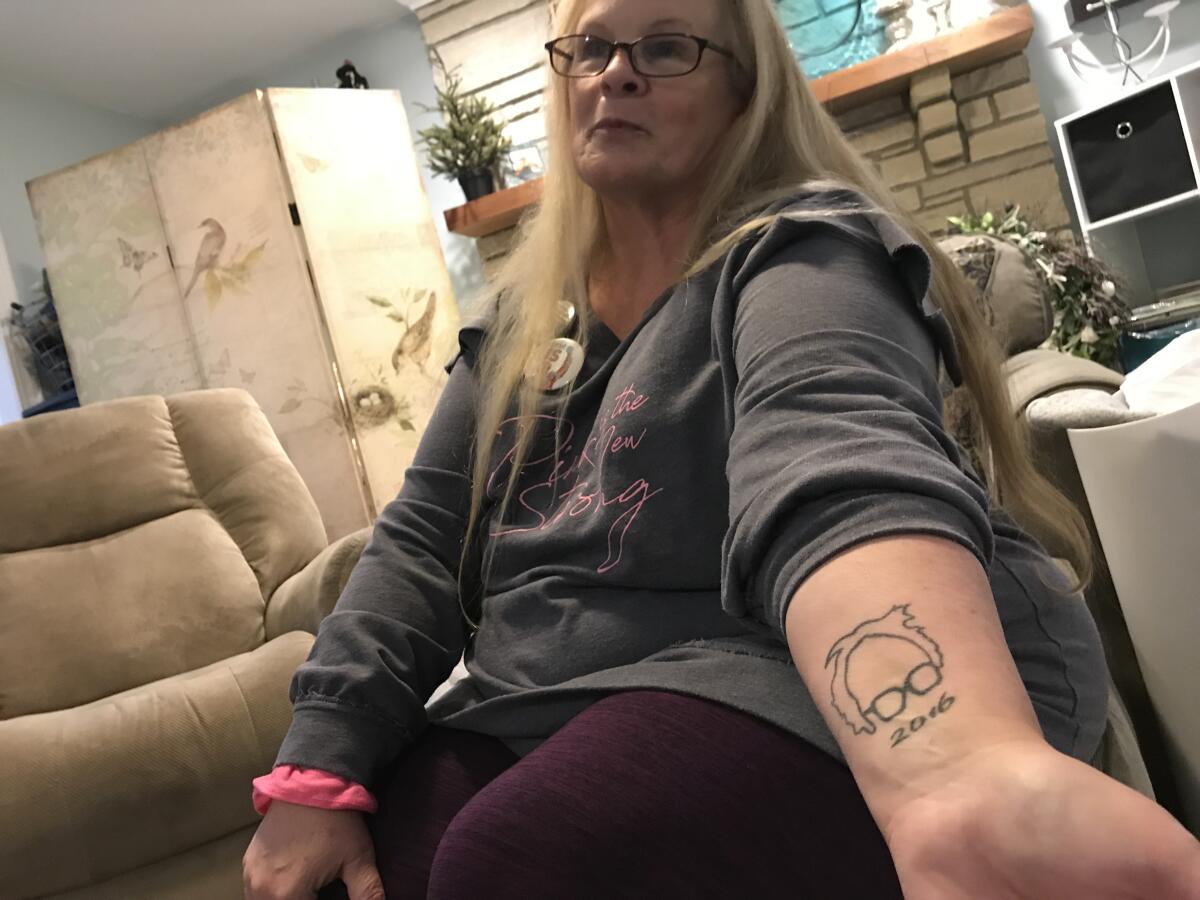
“When I’m lying in the morgue, they’ll know I fought in the revolution, I did my best,” said campaign volunteer Gina Franklin, 62, of Marion, Iowa, showing off a Sanders tattoo on her forearm at a recent phonebanking session. “No disrespect to men, I consider Bernie Sanders the best man on the planet.”
Sanders has lassoed that sort of passion to become the Democratic field’s top fundraiser last quarter; his army of small donors gave tens of millions of dollars with an average contribution of just $18, a sign of his grass-roots strength, campaign spokesman Joe Calvello said.
That money has allowed Sanders to place 133 paid staff across the state as of last week.
Many Sanders supporters drove across state lines to see him in Iowa earlier this month as he stumped with Ocasio-Cortez in Council Bluffs, Des Moines and Coralville, drawing crowds exceeding 2,000 people, some of the largest in Iowa so far.
“We don’t watch the polls; we change the polls. We bring people to caucus, and we talk to people who have never been engaged or involved before,” Ocasio-Cortez, a fellow democratic socialist, told the audience in Coralville, sharing how she won her seat by dramatically boosting turnout.
A dozen Democratic presidential candidates, including newcomer Deval Patrick, Kamala Harris and Bernie Sanders, descend on Long Beach for a state party convention and Latino forum.
Wayne Moots, 25, a college student who works in food service in Kansas City, Mo., left at 7 a.m. on a Saturday with three friends to carpool to Des Moines to a Sanders rally focused on climate change.
“My friend who drove, she started dating this guy, and he kind of turned her into a socialist,” Moots said. (“But in a good way,” he added.)
Moots said there were “quite a few people people I know who came up from Kansas City to help him campaign,” and he, too, wants to get more involved.
But some doubt Sanders’ electability in a general election, the watchword in this campaign season.
Aric Nielsen, 23, of Omaha, who attended the Council Bluffs rally, described himself as a “fiscal socialist” who supported Sanders in 2016 but now prefers Buttigieg.
Nielsen thinks the Indiana mayor has a better shot of beating President Trump because of his military service and his conciliatory style. Nielsen works with “very conservative, blue-collar people” who do trenchwork for a nonunion excavation firm, and their responses to Sanders are “‘Blah!’ Disgust.”
“Once you throw in the term ‘socialism,’ people just freak out,” said Nielsen, who was wearing a pro-Sanders shirt. “It’s all, ‘We don’t want to give free [stuff] away. ... You need to work for what you get.’”
In between bashing banks and billionaires, one of Sanders’ themes is encouraging listeners like Nielsen to dream bigger.
“The greatest obstacle we face is the limitation to our own imagination,” Sanders said at the Council Bluffs rally. “What this campaign is about is a new vision for what Americans are entitled to as human beings.”
At a phonebanking and training session recently in a Des Moines campaign office, more than 15 Sanders volunteers sat at folding tables arranged in a horseshoe and shared why they back Sanders.
There was the usual: support for “Medicare for all,” the Green New Deal to fight climate change, getting money out of politics. A Sanders staffer told the volunteers to use their own stories when talking to potential voters.
The acronym “AAR!” was written on a dry-erase board, reminding volunteers to “affirm, answer and redirect” — to acknowledge the voter’s position on an issue but to look for stronger common ground. By the end of the session, the volunteers would add 15 Iowans to Sanders’ list of supporters.
Campbell, the clinic manager, was among the volunteers making calls. She spends much of her workdays battling private insurance companies to pre-authorize medical procedures, a process she thinks would no longer be necessary under Medicare for all, in which the government oversees payment.
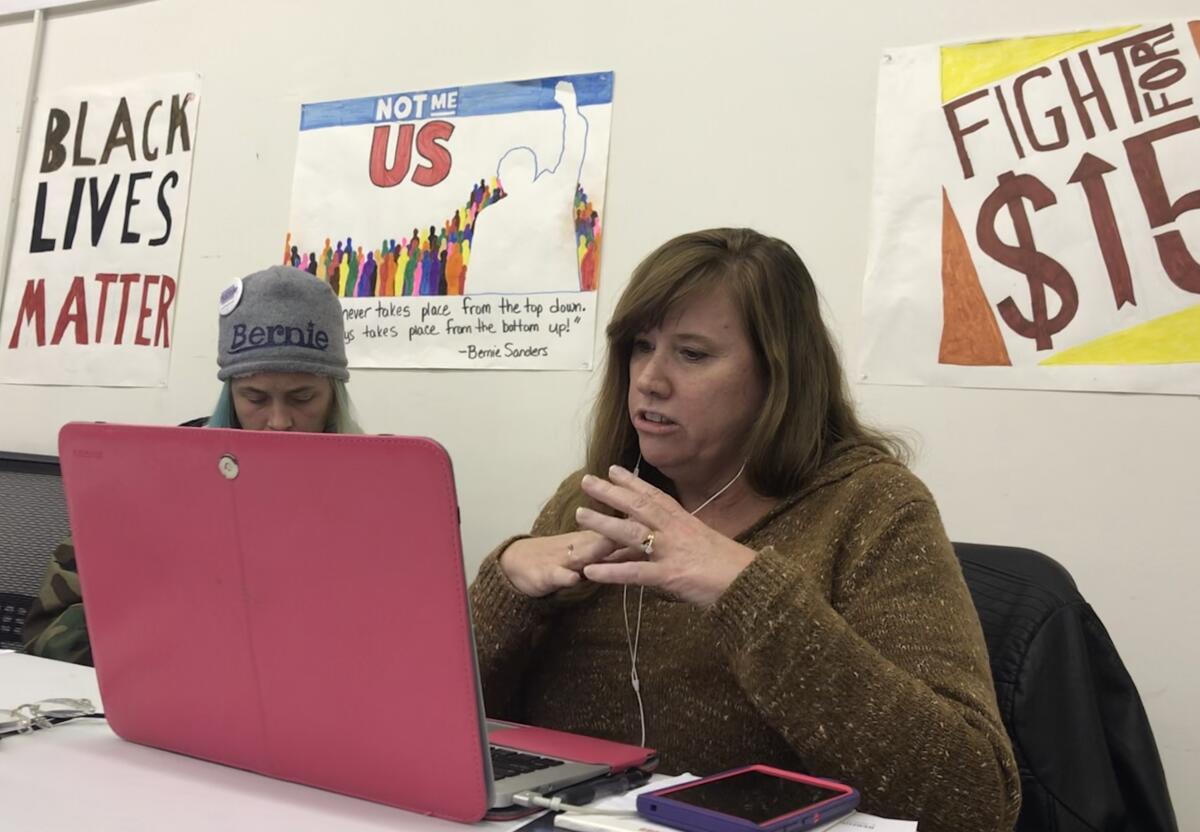
After a few unanswered phone calls, Campbell reached a woman and asked if she supported Sanders.
“Oh! Well you’re exactly the kind of person we’re trying to reach, then!” Campbell said.
The woman had never caucused before. Campbell explained how the process worked — and then was deflated when the woman told her she was probably moving out of Iowa before caucus day.
But the woman was interested in volunteering for Sanders in the meantime, and Campbell gave her information about a field office opening in Ankeny the following week. All in all, a successful call for Campbell.
“I’m really glad you’re charged up to support Bernie,” Campbell said, “wherever you are.”
Michael Finnegan contributed to this report from Los Angeles.
The field is down to Joe Biden now that Bernie Sanders ended his presidential campaign. Here is the Democrat heading for a battle with President Trump.
More to Read
Get the L.A. Times Politics newsletter
Deeply reported insights into legislation, politics and policy from Sacramento, Washington and beyond. In your inbox three times per week.
You may occasionally receive promotional content from the Los Angeles Times.
